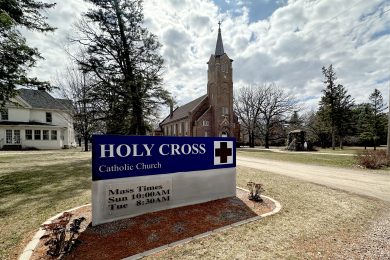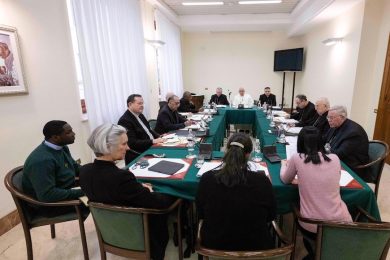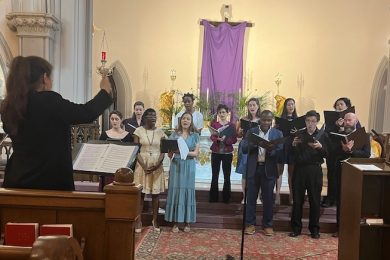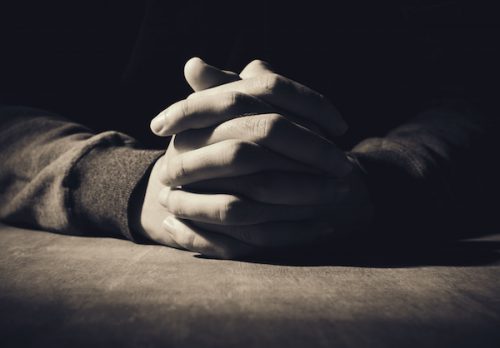Q: In your November column you briefly discussed the liturgical year. As we head into the new calendar year, are there some liturgical celebrations that we should take note of?
A: When the ancient Romans portrayed the god Janus, for whom the month of January is named, they gave him two heads. That served him well as the god of doors and gateways, because he could look backward and forward at the same time.

It is good for us to do the same in this first month of the new year. The calendar gives us several special opportunities to do so.
Forty-four years ago, on Jan. 22, 1973, the U.S. Supreme Court legalized abortion in this country. That was a black day in our nation’s history, but the “Day of Prayer for the Legal Protection of Unborn Children,” observed on Jan. 23 this year, helps us to reaffirm our belief that all human life, especially the life of God’s tiniest and weakest human creatures, is sacred.
It is a day to reaffirm our opposition to anything that weakens or destroys human life from conception to natural death, the life that is God’s beautiful choice for each of us. It is a day to offer intercessory prayer for all who suffer from the evil of abortion. Thus we pray in the first collect from the Mass “For Giving Thanks to God for the Gift of Human Life”:
God our Creator,
we give thanks to you,
who alone have the power to impart the breath of life
as you form each of us in our mother’s womb;
grant, we pray,
that we, whom you have made stewards of creation,
may remain faithful to this sacred trust
and constant in safeguarding the dignity of every human life.
The second opportunity for looking backward and forward is the annual Week of Prayer for Christian Unity (Jan. 18-25).
Certainly much progress has been made in the search for Christian unity that Jesus prayed for at the Last Supper (John 17:20-21). Through his apostolic journeys to various countries, Pope Francis has continued such efforts made by St. John XXIII, St. John Paul II and Pope Emeritus Benedict XVI, and he has highlighted his own commitment to work for full and visible communion among Christians.
Complete unity remains part of God’s future. But where we want to be in God’s future tells us what we should be doing in our present, and that includes our duty to pray and work for Christian unity.
Reconciliation between Christians is God’s work and our work. The theme of this year’s Week of Prayer for Christian Unity is “Reconciliation: The Love of Christ Compels Us” (2 Corinthians 5:14-20). This theme finds its origin in Pope Francis’ 2013 apostolic exhortation, “The Joy of the Gospel,” in which we find the quote, “The love of Christ compels us” (paragraph 9). This theme also recalls the episcopal motto of St. Cloud Bishop Emeritus John Kinney.
This year we will mark the 500th anniversary of the Reformation begun by Martin Luther in 1517. We look backward to his efforts to purify the church in the 16th century and we lament the deep divisions within the church that have been fueled by mistrust, misunderstanding and political agendas throughout the centuries. But we also look forward in joyful hope for the reconciliation that is God’s will for all who believe in Christ and to which the love of Christ compels and impels us.
International agreements worked out between scholars and theologians and approved by prelates, welcome though they be, will not achieve Christian unity unless individual believers — you and I — and congregations promote such unity.
Do we more easily mark the differences between Christians than the similarities? If we do, we are hindering the reconciliation that becomes our mission at baptism. Becoming more familiar and comfortable with the worship of non-Catholic Christians and participation in ecumenical worship services will help us to do this, for we will discover how much we share with our fellow Christians. We will be able to rejoice in the riches of prayer language, sacred music and religious culture that other Christian traditions offer us as we seek reconciliation together.
Clearly, the first disciples of Jesus had to leave much that was old and familiar behind if they were to welcome the new and surprising in Jesus Christ. They looked backward to God’s marvelous deeds in the past, but also forward to what God was promising in the future. We must do the same, if our proclamation of the good news of Jesus Christ is to open human hearts to reconciliation in the year of our Lord 2017.
Looking backward and forward, it may not be too late to make some new year’s resolutions: to proclaim the good news of God’s kingdom in respect for human life and in efforts for Christian unity.
This year, Inauguration Day, Jan. 20, fell during the Week of Prayer for Christian Unity. This day is not a particularly Christian celebration, but certainly the people of our country need abundant reconciliation after last year’s bitterly divisive presidential campaign.
Whether we like the outcome or not, we need to pray that the Trump Administration and Congress will help us grow in our identity as “one nation, under God,” as we strive to overcome divisions of age, class, race and gender and recommit ourselves to working for the dignity and well-being of all people. Inauguration Day bids us pray that those elected to serve in public office will direct their minds and hearts to the common good:
Almighty ever-living God,
in whose hand lies every human heart and the rights of peoples,
look with favor, we pray,
on those who govern with authority over us,
that throughout the whole world
the prosperity of peoples,
the assurance of peace,
and freedom of religion
may through your gift be made secure.
(collect “For Those in Public Office” and also used in the Solemn Intercessions on Good Friday)
Benedictine Father Michael Kwatera, a monk of St. John’s Abbey in Collegeville, serves as the abbey’s director of liturgy. Please send your questions on liturgy to him at mkwatera@csbsju.edu or at St. John’s Abbey, P.O. Box 2015, Collegeville, MN 56321-2015.






















